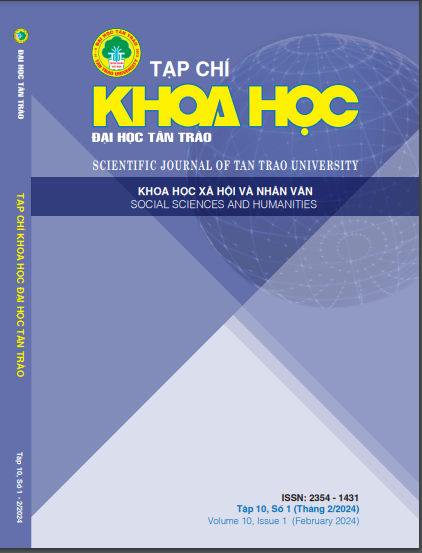CÔNG TÁC GIÁO DỤC PHÒNG CHỐNG XÂM HẠI TRÊN KHÔNG GIAN MẠNG CHO HỌC SINH Ở CÁC TRƯỜNG TRUNG HỌC CƠ SỞ HUYỆN SƠN DƯƠNG, TỈNH TUYÊN QUANG
DOI:
https://doi.org/10.51453/2354-1431/2024/1165Từ khóa:
Không gian mạng, xâm hại trên không gian mạng, phòng chống xâm hại, học sinh trung học cơ sởTóm tắt
Bài báo tập trung nghiên cứu thực trạng công tác giáo dục phòng chống xâm hại trên không gian mạng cho học sinh các trường Trung học cơ sở huyện Sơn Dương, tỉnh Tuyên Quang. Nghiên cứu tiến hành khảo sát 79 giáo viên, 300 học sinh của 3 trường THCS trên địa bàn về tầm quan trọng, mục tiêu, nội dung, phương pháp, hình thức và các yếu tố ảnh hưởng đến hoạt động giáo dục phòng chống xâm hại trên không gian mạng cho học sinh. Nghiên cứu được thực hiện bằng phương pháp điều tra xã hội học, phương pháp phỏng vấn sâu và thống kê toán học để thu thập số liệu, phân tích, đánh giá thực trạng. Kết quả nghiên cứu đã cho thấy những ưu điểm và tồn tại, hạn chế của công tác này trong các Nhà trường. Nghiên cứu là dữ liệu tham khảo để đề xuất các biện pháp nâng cao hiệu quả của giáo dục phòng chống xâm hại trên không gian mạng cho học sinh THCS hiện nay.
Tải xuống
Tài liệu tham khảo
Beran, T. N., and Li, Q. (2005). Cyber- Harassment: A Study of a New Method for Old Behavior. The Journal of Educational Computing Research, 32(3), 265-277. http:// dx.doi.org/10.2190/8YQM- B04H-PG4D- BLLH
Doan Thi To Uyen (2020), Current status of child protection in cyberspace in Vietnam, Journal of Encyclopedia and Encyclopedia, No. 5 (2020)
Jullia C.Davidson & Elena Martellozzo (2008), Protecting vulnerable children in cyberspace from educational use: raising awareness and responding globally, https://doi. org/10.1080/15614260802349965 Children’s Law (2016) Cybersecurity Law (2018) Masoumeh Afzali Gorouh, Hajar Azari, Mohammad Farajiha (2021), Analyzing the Role of Media in Preventing Sexual Abuse of Girls in Cyberspace, The Internationnal Journal of Humanities.
Nguyen Huu Thanh (2023), Strengthening Children Against the Impact of the Internet Today, Journal of Social Sciences and Human Resources (No. 12).
Nguyen Phuong Thao, Ha Ngoc Quynh Anh (2023), Child sexual abuse on cyberspace in Vietnam - Current situation and prevention
solutions, Journal of Law and Practice - No. 55/2023
Nguyen Thi Thanh Thuy, Do Van Trong (2023), Safety for women and children in cyberspace, State Management Magazine,
No. 329 Decision No. 830/QD-TTg dated June 1, 2021 of the Prime Minister approving the program “Protecting and supporting children to interact healthily and creatively in the online environment for the period 2021 - 2025”
Decision No. 311/QD-TTg dated March 5, 2022 The Prime Minister approved the Program “Educating revolutionary ideals, ethics, and cultural lifestyle for youth, teenagers, and children on cyberspace for the period 2022 - 2030”
Plan Vietnam (2022), Protecting Children Online, Training Materials United Nations Office on Drugs and Crime -
UNODC (2015), Study on Effects of new Information Technologies on the Abuse and Exploitation of Children
https://www.unicef.org/vietnam/vi/thong-cao- bao-chi/cyber-bullying-and-the- impact-on- children’s-psychology
https://vtv.vn/the-gioi/lam-dung-tinh-duc-tre- em-truc-tuyen-cao-ky-luc-vao -nam-2021- 20220113190718088.htm
Tải xuống
Đã Xuất bản
Cách trích dẫn
Số
Chuyên mục
Giấy phép

Tác phẩm này được cấp phép theo Giấy phép Quốc tế Creative Commons Attribution-ShareAlike 4.0 .
Bài báo được xuất bản ở Tạp chí Khoa học Đại học Tân Trào được cấp phép theo giấy phép Ghi công - Chia sẻ tương tự 4.0 Quốc tế (CC BY-SA). Theo đó, các tác giả khác có thể sao chép, chuyển đổi hay phân phối lại các bài báo này với mục đích hợp pháp trên mọi phương tiện, với điều kiện họ trích dẫn tác giả, Tạp chí Khoa học Đại học Tân Trào và đường link đến bản quyền; nêu rõ các thay đổi đã thực hiện và các nghiên cứu đăng lại được tiến hành theo cùng một bản quyền.
Bản quyền bài báo thuộc về các tác giả, không hạn chế số lượng. Tạp chí Khoa học Tân Trào được cấp giấy phép không độc quyền để xuất bản bài báo với tư cách nhà xuất bản nguồn, kèm theo quyền thương mại để in các bài báo cung cấp cho các thư viện và cá nhân.
Mặc dù các điều khoản của giấy phép CC BY-SA không dành cho các tác giả (với tư cách là người giữ bản quyền của bài báo, họ không bị hạn chế về quyền hạn), khi gửi bài tới Tạp chí Khoa học Đại học Tân Trào, tác giả cần đáp ứng quyền của độc giả, và cần cấp quyền cho bên thứ 3 sử dụng bài báo của họ trong phạm vi của giấy phép.






